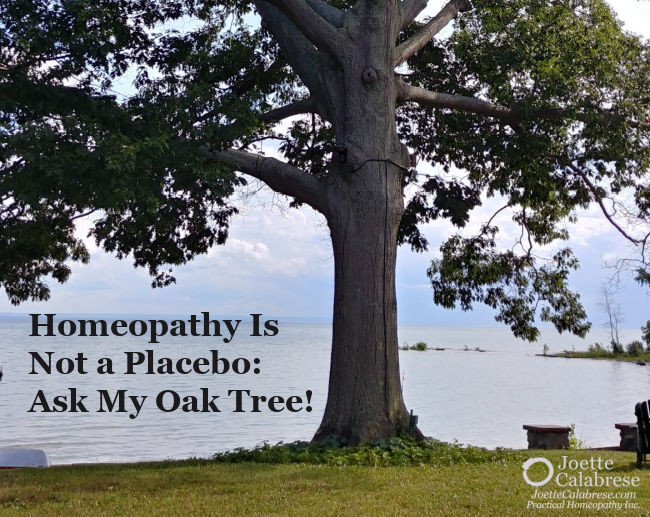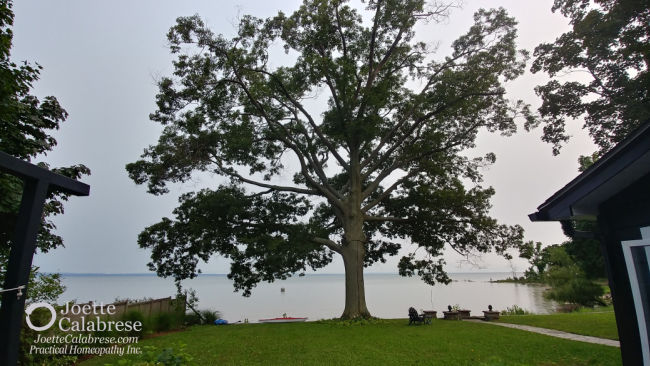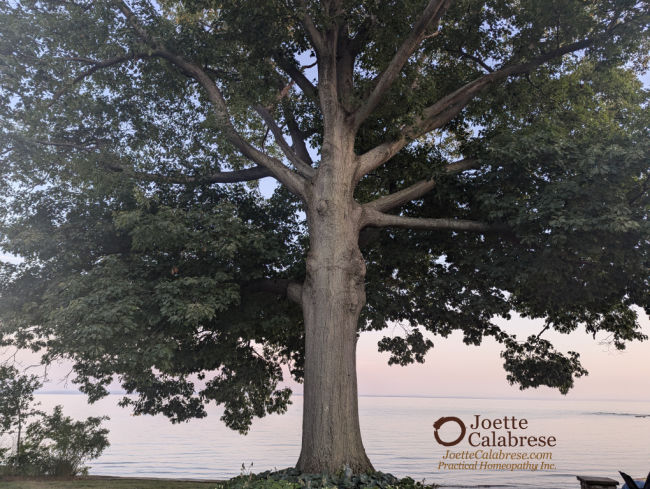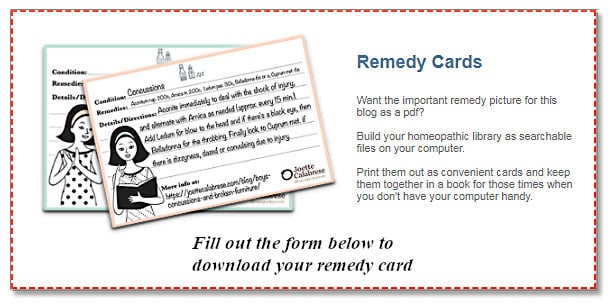If a tree falls in the forest and no one is around to hear it, is there a chance it’s been crying out for homeopathy?
Ask my oak tree.
One of the most consistent arguments against homeopathy is that there is so little of the original gross substance remaining in the diluted and potentized medicine that it must be functioning as a simple placebo.
Okay, here’s a question for those naysayers: If homeopathy is merely a placebo, then why does homeopathy act on plants that are incapable of expectation bias?
Again, let’s ask my oak tree.
Now, lest you think I’ve gone ‘round the bend, I realize that trees can’t talk. Luckily, a photo is worth a thousand words.
Homeopathy for Plants
Six years ago, we bought a cottage with a beautiful old oak tree in the yard. Our neighbors said the tree was at least 120 years old, according to their parents and grandparents. So, this old oak was a sturdy, resilient tree that had most assuredly been around to witness a thing or two.
However, as you can see from this “before” photo, it was suffering.
I was never quite sure what caused the tree to decline, although consensus seems to point to the next-door neighbors' installation of a pool. Of course, I’m not an arborist, but judging from the tree's canopy, the digging and/or leaching chemicals in the gunite or shotcrete probably distressed its roots. And it had been showing signs of distress for years before we moved to there.
No matter the cause, I knew the tree had been crying out for homeopathy, and I think I heard it.
I looked at the circumstances as a vascular injury to the tree. Consequently, I utilized Arnica montana 3C (one of our leading homeopathic medicines for heart and vascular issues).
I also called upon Hyland’s Bioplasma®, a combination remedy comprising all 12 of the cell salts vital to overall wellness. (I’ll talk more about Bioplasma in an upcoming blog post.)
If I didn’t have Bioplasma, I would add Silicea to the tree’s water. Silicea is one of the 12 cell salts and is known for addressing a lack of hardiness.
Method for Providing Homeopathy for Plants
How did I administer the medicines to the tree? I simply dissolved a couple of doses of each in a large pitcher of water and poured the medicine around the base every week for about four months. I’ve kept up with this regimen every summer and fall for the last six years.
If homeopathy were a placebo, my oak tree might have continued to fail until it died. However, over time, it began to thrive once again. I took the following photograph six years after the first photo — almost to the day. What a difference!
This example also serves as an excellent analogy for how homeopathy addresses chronic conditions in humans.
This was a 120-year-old tree that had been in decline for some time before I came along and heard its cries for help. We can compare that to an adult who has experienced a chronic condition — say, allergies — for many years. The sufferer may say, “I started using homeopathy six weeks ago; why have my allergies not been eliminated quickly?”
While a well-chosen homeopathic medicine employed as an SOS for an acute condition may surprise us with how quickly it can act, it takes time to see a shift in a chronic condition. Chronic conditions don’t appear in a day and likely won’t resolve in a day.
Like my tree, it often takes time to halt the momentum of decline and then make the complete 180° turn to robust health. But it does happen. I see results every day in the feedback I receive from clients and students.
And you can see the results with your own eyes in my tree. The difference before and after homeopathy is gobsmacking, isn’t it?
My dear friends, I assure you, I did not explain to my tree that it was receiving homeopathy in its water. I did not offer it any blog posts or read to it from the materia medica. My tree was not swayed by my confidence or influenced by faith that this medicine could work. As much as I love that tree, it’s not much of a deep thinker or conversationalist.
However, homeopathy acted just the same — without any medication prejudice from the placebo effect.
Homeopathy Is Not a Placebo
If my oak tree’s experience is insufficient to convince the naysayers, there’s more. Once again, I offer this fascinating explanation of a scientific experiment conducted on duckweed plants from the Homeopathy Research Institute. It’s hard to cry “placebo” after viewing the short video “Using Duckweed to Investigate the Effectiveness of Homeopathy.”
Pass on the good news of Practical Homeopathy®!
Warmly,
P.S. A Gateway to Practical Homeopathy® study group is the perfect way to learn more about homeopathy. Gather up some friends and start a group yourself. Or join a study group led by one of my experienced Ambassadors. As students and graduates of The Academy of Practical Homeopathy®, my Ambassadors have unique knowledge to launch your studies to the next level.
Purchase your study group curriculum, and then log into your dedicated Gateway to Practical Homeopathy® I, Second Edition portal. In the Welcome section, you’ll find a list of the next Ambassador-led study groups organized by starting date. Plenty of options enable you to find the time best suited to your schedule.
And don’t stop there! If you’ve already taken Gateway I, be sure to continue with Gateway II. In this second part of the Gateway series, I delve much more into the cell salts. There are also valuable lessons on colds, influenza, seasonal allergies and common emergencies.








Amazing. There’s hope for us all. I love this story, thank you.
…I wonder, how can I apply this to my cat, who has a chronic cough? It is loose, she coughs up a little phlegm. It happens at different times of the day. The vet had no answers for me when I asked about it and I don’t want to give her medicine that may have a negative effect. She is a really wonderful cat, affectionate, social and energetic. I want to help her with homeopathy but I don’t know how to do so.
Stacey, Take a peak at some of my blogs on the subject of coughs. The method and remedies are the same for humans and cats.
Sometimes it’s the dust from cat litter that can irritate their lungs.
…also, it may be asthma from what I’ve read about the symptoms – she sticks her neck out and coughs. Once in a while she sounds like she has trouble breathing she is so congested. It is rare but sometime she vomits after, I think because she coughs so long, using her stomach muscles. She supresses her cough, breaths shallow to avoid coughing. I really want to find something to help her. She is so precious to me…
I absolutely love this post! Thank you for sharing.
I love homeopathy and all of its applications. I’m curious though about this oak tree blog. You have another blog from 3 years ago telling the same story, but with a maple tree. Remedies slightly different.
These are two different trees about 30 feet apart from each other. And you’re right; its the same story with a variation on the method I used. I often offer a variation on a theme because I don’t want readers and students to believe there’s only one way to approach the same conditions.
Thank you for the clarification
Can Homeopathy also help my two dragon palms, they have a fine white powder or insect on them and they are dying fast, help
I have successfully treated several trees with homeopathy and it fascinates me every time! Lycopodium for a tree that had yellowing leaves that were falling in the spring. Carbo veg for a pear tree that failed to take off after planting and wasn’t pushing leaves and Arnica on a lilac bush that had suffered some trauma in the past and just wouldn’t grow. Within 2 weeks of treatment, it had a new shoot?
What should I give my Lemon tree about 20 years old. Gave a few lemon for few years. Then few large pomelo sized lemons for 3 years. Has not borne any lemons for over 10 years. I think something is not right. Gets water , nutrients etc.
Thank you.
Thank you! Plant (and animal) homeopathy is always appreciated!
What about old oak tree stressed from severe drought over last few years?
Cell salts such as the combination found in Bioplasma could be helpful.
This is fantastic!!! Do you know of a remedy to help with Fire Blight in an apple tree? I’d really like to save my tree!!!! Thank you.